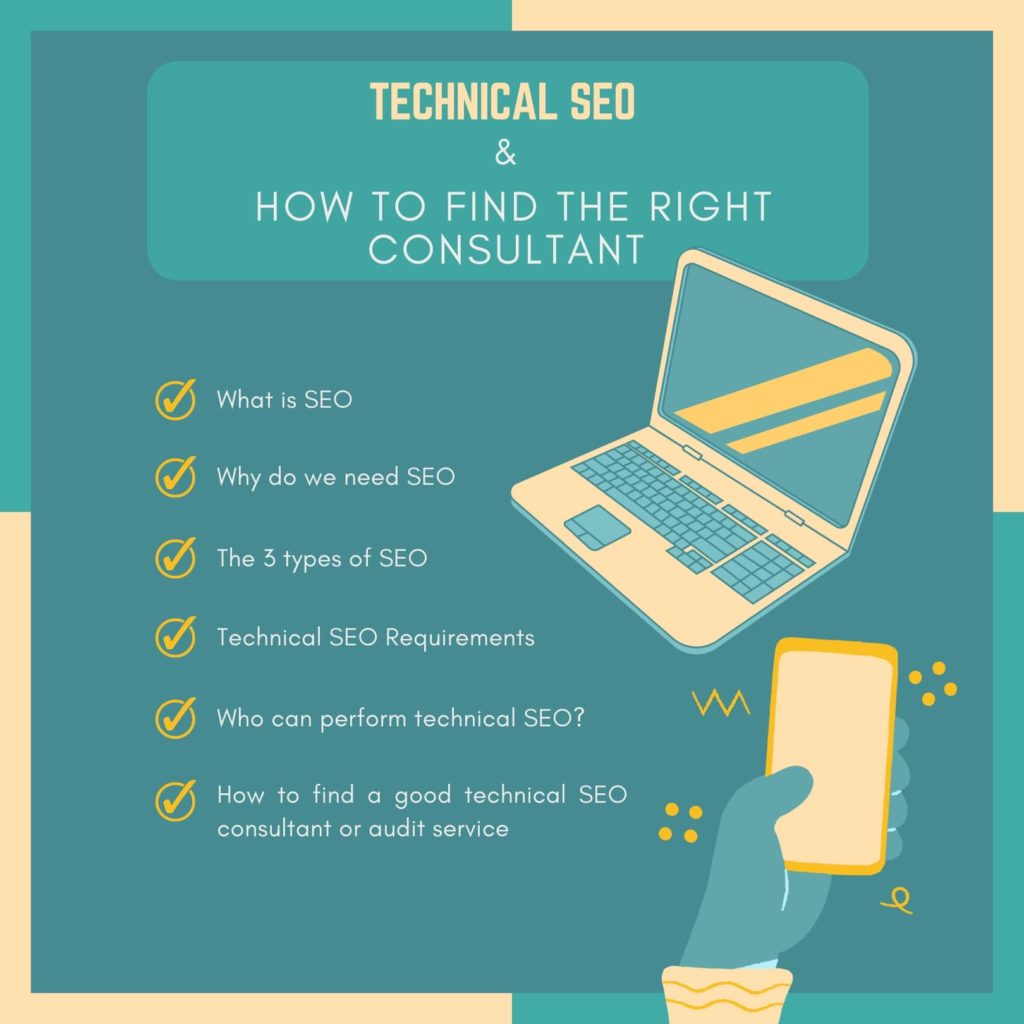
It’s getting harder and harder to figure out SEO all by yourself, especially when the SEO checklists you find online get techier and increasingly confusing. Luckily, technical SEO consultants and SEO technical audit services are just a click (or Google search) away. But how do you find the right one for your business?

SEARCH ENGINE OPTIMIZATION
Like many marketing terms widely bandied about, wrapping your mind around SEO can be a hassle.
Let’s start with a simple definition: SEO stands for Search Engine Optimization. It represents a set of skills, practices, and techniques that make your website easier to discover and index by search engines like Google.
WHY DO WE NEED SEO?
Businesses try to apply SEO practices to rank higher in relevant search queries.
Let’s absorb this notion using a simple example. If you’re a wholesale food distributor from Chicago, you’ll want potential customers to find your business when they type in “Chicago wholesale food distributors” and hit Google’s “Search” button. Ranking high in searches related to your target audience means your website gains organic, non-paid traffic.
Organic traffic ultimately leads to boosted sales and loyal customers. Because of this, everyone’s fighting for a great spot on the Search Engine Results Pages, or SERPs for short.
At some point in the digital existence of your business, you begin to wonder: how can I get more traffic on my website? And is there a way to make sure that potential customers always reach it on Google? You’ve most likely guessed the answer: SEO.
There are a few optimization measures that anyone can take with a fair deal of research and practice. However, only trained professionals (with web development skills up their sleeves) can execute the more technical aspects of SEO, particularly when it comes to code, security, and server-level optimizations. Before digging deeper into how to find the right technical SEO consultant or audit service, let’s better understand what we’re looking for.
The 3 types of SEO
With SEO, or Search Engine Optimization, we can speak about three main (intertwined) categories: on-page, off-page, and technical.
- On-page SEO focuses on your internal website structure, its functionality, and the quality of its content. If you’d like to know more about it, check out this Mejix blog.
- Off-page SEO focuses on how authoritative and popular your website is compared to other web platforms in the same market segment. We have a whole blog on off-page SEO, so be sure to check it out for some pretty cool insights!
- Thirdly, there’s technical SEO—a process ensuring that a website is up-to-date and meets all of the technical requirements of modern search engines. In short, technical SEO practices aim to improve specialized aspects like crawling, indexing, and website architecture.
Correctly performed, these SEO practices ultimately contribute to better search rankings and a spike in organic website traffic.
TECHNICAL SEO REQUIREMENTS
Technical SEO ensures that your website is optimal, safe, and well-structured for both human users and search engines. To better grasp its reach, we’ve created a list of items and principles.
CORE SEO: WEBSITE STRUCTURE (HIERARCHY, SITEMAPS, NAVIGATION)
Before anything else, you’ll need a good structure for your website. The architectural design includes how you organize written and visual information, the number of landing pages on your site, and how they’re linked to one another (internal linking structure). But it also comprises things like good website categorization, URL structures, sitemaps, and proper robots.txt file usage, which all play a significant role in how search engines index your website.
As a rule of thumb, a good website architecture consists of a few well-organized levels that the Googlebot can easily crawl and index. Keep in mind that creating a well-structured website also helps and encourages users to stay on it, navigate, and make purchases. By contrast, if users generally leave your website too quickly (high bounce rates), this may give off “bad signals” to search engines like Google.
TECHNICAL SEO: 2 CRAWLING & INDEXING FACTORS
ROBOT.TXT
Should start by checking your robots.txt file, which is the point of reference for any web-crawling engine. Long story short, the robots.txt file teaches search engine crawlers which URLs they should access (or crawl) on your site and which URLs they should avoid.
This is a public file that you can check by typing “robots.txt file” after any web domain (in our case: https://dine.agency/robots.txt).
According to Google, “unless you specify otherwise in your robots.txt file, all files are implicitly allowed for crawling.” URLs that you should usually disallow in your robots.txt file are admin pages, temporary files, cart or checkout pages, search-related pages, and others—depending on the website’s structure and content. As you might have guessed by now, these are aspects that web developers and SEO consultants can advise you on.
Properly using the robots.txt file has some undeniable perks: you save server resources, bandwidth, avoid overloading your site with requests, and make clever use of your “crawl budget,” since only a limited number of pages can be included in a crawl and thus indexed.
Finally, make sure to include the location of your XML sitemap(s) in the robots.txt file. But, wait…the what now?
XML Sitemaps
An XML sitemap is a file that lists the most important pages on a website. A good sitemap ensures that web crawlers can easily find your pages and understand your overall website structure without too much hassle. It’s also particularly helpful for listing pages that lack internal links pointing to them and would be difficult to discover and index otherwise. In short, XML sitemaps instruct engines on your site structure and what they should index.
A well-optimized XML sitemap should include new content added to your website (like new blogs) and only 200-status URLs (pages that can be successfully accessed). By contrast, it should exclude 301 redirects, no-index tags, 4xx or 5xx status code URLs, and duplicate content.
OTHER TECHNICAL SEO REQUIREMENTS
LOADING SPEEDs
A technical SEO strategy should maximize your website’s loading speeds, also known as server response times.
CODE QUALITY
Naturally, SEO also relies on efficient website code. Therefore, technical teams have to ensure that no superfluous functions or idle code sections are present.
MOBILE OPTIMIZATION
Nowadays, ensuring that a website is fully optimized for mobile device usage is crucial for search engine rankings, primarily due to the growing number of users who use their smartphone devices to access and browse the web.
WEBSITE SECURITY
Lastly, you’ll need a technical team to regularly perform website security checks. In general, running performance checks and using analytics and SEO-tailored tools will help web developers and SEO specialists make structured, regular improvements to all of the abovementioned aspects.
WHO CAN PERFORM TECHNICAL SEO?
If we stop to think about the vast technical expertise needed to devise a proper SEO strategy, we’ll quickly realize that technical SEO is best performed in a cross-functional team by a web developer or SEO specialist.
The best optimization strategy will often result from continuous collaboration between SEO specialists, content strategists, UX designers, web developers, and marketing consultants.
HOW TO FIND A GOOD TECHNICAL SEO CONSULTANT?
Usually, you will find the best technical SEO consultants in a digital marketing or web development agency specializing in SEO. “Specialized” entails the digital agency has all the professionals needed to improve the technical aspects of any website: SEO specialists, web developers, UX designers, and so forth.
TECHNICAL SEO AUDIT SERVICES
Are you ready to hear some great news? If you need a helping hand to figure out exactly how much technical SEO work needs to be done on your website, you can now contact us to apply for our free technical SEO audit services.
By doing so, you’ll get a full report of your website’s status before you decide to hire an SEO consultant or a digital agency!


